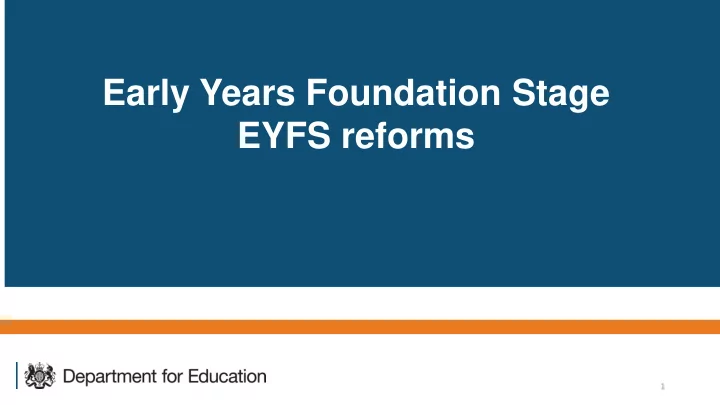

Early Years Foundation Stage EYFS reforms 1
EYFSP reform: Context and update • Our reforms were announced in June 2018 and they underpin two key objectives: reducing teacher workload and improving outcomes- particularly in language, literacy and maths • Revising the Early Learning Goals so that they: • The draft revised ELGs and EYFSP handbook are currently (began in Sep ‘18) being piloted in 24 - Focus on strengthening language and vocabulary development to help close the ‘word gap’ schools, to test the efficacy of the changes we have made. - Strengthen literacy and numeracy outcomes at the end of reception year • Better prepare children for Key Stage 1 – by better aligning with Year 1 The pilot is being led by the Education Endowment - Foundation in partnership with Natcen and Action for Are based on the latest evidence in childhood development – and the - Children and will conclude in July 2019. strongest predictors of future attainment • Are clearer for teachers to interpret – making the EYFSP assessment more An independent evaluation report by the Education - straightforward Endowment Foundation is expected in the autumn. • Streamlining assessment guidance and reviewing the moderation process • A full public consultation on the revised EYFS will to: follow in autumn/winter 2019/20, with statutory roll of the reforms expected in AY 2021/22. - Reduce teacher workload and strongly encourage teachers to use their professional judgement and reduce reliance on unnecessary evidence • We also have plans for voluntary opt-in for AY 2020/21. Make clear that the ELGs are not the curriculum – they are an end point - measure of what a child should be demonstrating by the end of the EYFS. 2
New EY curriculum guidance – why are we doing this? Curriculum guidance is currently being developed through an update of the Development Matters non-statutory guidance - aims to focus practitioners and teachers on the importance of rich daily activities to improve outcomes and help reduce workload Julian Grenier is leading this work with us We aim to roll out new curriculum guidance alongside the EYFS reforms Improve early years In line with wider social mobility ambitions- to improve outcomes for outcomes disadvantaged children to narrow development gaps. Re-casting the focus on curriculum rather than assessment and providing Reducing Workload a foundation for helping teachers and practitioners to plan Burdens setting/classroom activities Making reception year count – by supporting teachers with specific Specific Reception Year curriculum guidance to ensure all children have strong foundations to guidance begin Year 1. This will be part of the overall guidance document covering the whole EYFS age-range. 3
Core principles of a new Development Matters Buildings & places We would like to hear your views on: 1. The new document should be clear about purpose (Mela Watts) and objectives, simplified and succinctly easy to follow for practitioners and teachers. • How can the ages-stages development points- be structured to be helpful in observing development but 2. Retain the positive content of Development Matters. simultaneously discourage unnecessary tracking? This piece of work is not about delivering wholesale change, but improving on a familiar structure to meet • our objectives. How useful would links be to examples of effective practice? 3. Cover what children should be guided to do under each of the seven areas of learning as set out in the • What would you like to see as an addition to the new EYFS framework and not against the ELGs , in order to discourage unnecessary tracking of development guidance – which would be helpful to practitioners? stages. This should shift the focus to teaching against the areas of learning and not what is assessed. 4. Be fairly high level and non-prescriptive - this is about providing practitioners and teachers with a guide to help with curriculum planning and not the plan itself. 5. Be rooted in a sound evidence-base of effective practice -where possible. 4
Stakeholder engagement Early Years L&D Advisory Panel. • Alongside our advisory panel, we want to hear Will provide challenge and advice at key points in developing new feedback from the wider early years sector – as document. the guidance develops • Julian Grenier has been working with a wide range of experts and practitioners within the sector and will continue to do so up until we produce a finalised document early next year. Julian Grenier with DfE draft new • We want to take an opportunity with these document England – wide events to engage with the sector to ensure we have a guidance document which Wider stakeholder engagement to peer review iterative drafts helps to reduce practitioner and teacher workload. New curriculum guidance 5
Advisory Panel EYFS Advisory Panel – membership Name Organisation Clare Sealy St. Matthias School Julian Grenier Sheringham Nursery School Dame Alison Peacock Chartered College of Teaching Civitas Emma Lennard Gill Jones Ofsted James Bowen National Association of Head Teachers Sara-Jayne Martin Roxbourne Primary School, Harrow Sir Kevan Collins Education Endowment Foundation Beatrice Merrick Early Education Iram Siraj Oxford University Jan Dubiel Early Years consultant (formerly Early Excellence) 6
Recommend
More recommend